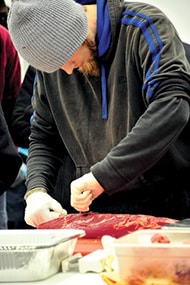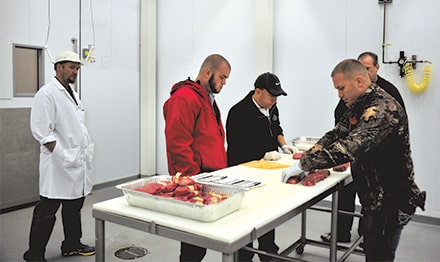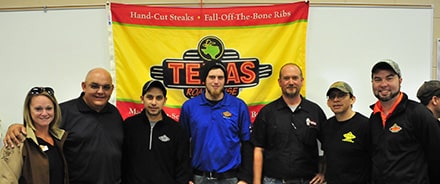
Pictured Right: Representing Snellville’s Texas Roadhouse, Matt Knox, carefully trims a ribeye in the Texas Roadhouse Meat Cutting Competition at the University of Georgia Meat and Sciences Division.
Knox, 25, a native Californian who for most of his life has called Lilburn home, is a fast-rising star in the little-publicized field of professional meat cutting. On Sept. 2 at the University of Georgia’s Meat Science & Technology Center in Athens, Knox, a full-time meat cutter for the Texas Roadhouse steakhouse in Snellville, placed second overall in the first round of the Texas Roadhouse National Meat Cutters Competition to advance to the regional event to be held in Orlando, Fla., in February. The seven regional winners will advance to the national competition, now in its 15th year and featuring the finest cutters in the Texas Roadhouse chain, to be held in Phoenix, Ariz., in April, at the company’s Managing Partner Conference.
The national winner will take home a cool $20,000 in cash — after taxes.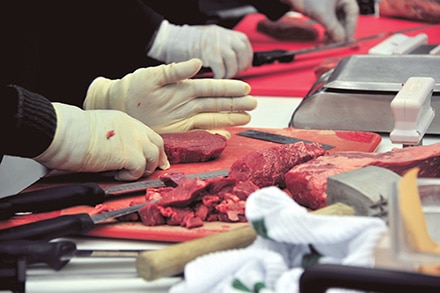
Over 20 Texas Roadhouse meat cutters from the SE Region competed at UGA’s Meat Science Division in Athens
“I’m pretty pumped,” said Knox, a 2007 graduate of Parkview High School. “It definitely would be life-changing in a lot of aspects. Our company is constantly growing, and to have the title of best meat cutter with Texas Roadhouse … the possibilities would be endless, not just with our company but in the restaurant business overall.
“And the money would be a whole different thing. A down payment on a house, if you wanted. Both would be phenomenal game-changers in my life.”
Knox earned his trip to Orlando by cutting four specific cuts of meat, each to a specific weight, with the proper yield and the least waste: 16-ounce ribeye, 11-ounce sirloin, and 6- and 8-ounce filets. All of the cuts were required to come from a single 7-to-8-pound slab of meat that each participant had to hand select and bring to the competition beforehand, which Knox said was a whole other challenge.
“I bet I spent two straight weeks searching for that perfect one,” said Knox, who has been with Texas Roadhouse for nearly eight years. “When you’re picking meat, you want to make sure you have the right-sized butts and loins. You want one that you’re comfortable with, clean and not that fatty.”
Then comes the challenge of wielding a razor-sharp carving knife to turn that slab of solid beef into quality, cost-efficient – and, most importantly, tasty — cuts.
“You really have to think your way through it,” Knox explained. “You don’t just grab it and start hacking away. There’s a little planning that goes into it, and some math because you have to get the proper weight for each cut and make sure it’s a clean cut.
“What I do is cut the 16-ounce first and get that out of the way, then I focus on the smaller cuts. Those are usually easier because those are the cuts that I do more often than the other ones at the restaurant.”
How Knox came to become a meat cutter is a story in itself. He started as a dishwasher, worked his way through various positions on the kitchen line then earned the right to start cutting meat.
“I saw how they cut the meat and got curious,” Knox said. “I just came in and tried to learn as much as I could. Then I became a back-up cutter a day or two a week and then about two weeks later became a full-time cutter. It was definitely an eye-opener.”
And now he’s close to earning meat-cutting fame, a shiny trophy and a small fortune due to his diligence and talents.
“It’s a friendly competition,” Knox said. “I mean, we all work together and get along. But at the same time, it would be cool to be able to say, ‘Hey, I beat all y’all.’ I’d be honored to hold that title.”
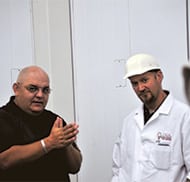
“The No. 1 thing it brings is quality,” said Sam Roper, managing partner of the Snellville Texas Roadhouse restaurant. “A lot of steakhouses get their meat pre-packaged or bring it in already cut. Quality is our No. 1 goal, and hand-cut steaks allow for a fresher product. The guest comes in and gets a quality, aged piece of meat, which is a better value than any other steakhouse.
Pictured Right: Sam Roper, Managing Partner of the Snellville Texas Roadhouse restaurant with Dr. Alex Stelzleni, Associate Professor of the University of Georgia’s Meat and Science Division.
“The yield that our guys are able to achieve now (than before the competition began) are definitely better. That’s really what the goal was. The more money we can save by training, and the more incentive we give them to get a higher yield, the lower we can keep our prices and stay value-priced versus some of our competitors.”
Each cut of meat was checked for quality and weight.

